What really happened in Ukraine
An article by Niclas Fogwall. © 2015
I have travelled to Ukraine and Russia numerous times, and have followed the Russian warfare closely. Russia has an army of propagandists who write in various blogs, forums and communities. Russia is also paying a number of western journalists and political parties to spread lies and desinformation which favour Russia and throw mud at Ukraine and anyone opposing Russia's warfare. Here I will describe the truth of what goes on and will also try to predict what might happen next.
Is there is a civil war in Ukraine?
No, that is a misconception. There are no conflicts between different peoples in Ukraine. No matter what language people prefer to speak, some speak Ukrainian and some speak Russian, they live peacefully side by side. Ukraine is being invaded by a foreign country, Russia, occupying two oblasts in the south east: Crimea and (most of) Donbas, and are providing an organization of pro-Russian terrorists with weapons, training and supporting troops.

Why is Russia invading Ukraine?
The Russian president Putin refers to Russia and Ukraine as brothers who should belong together. In other words, he believes that Ukraine should belong to, or to be controlled by, Russia, as in the old days when there was a Soviet Union, ruled by the Kremlin in the heart of Moscow. Putin is trying to return to these old days, to a strong imperial state with powers on an equality with USA. When the former president Yanukovich fled justice by fleeing to Russia after charges of severe corruption and responsibility for the many shootings at the Maidan square in Kiev, Putin lost an ally and understood that the Ukrainian people chose the EU and rejected Putin's newly formed Eurasian economic union. The people uprising worried Putin because he knew that it may spread to Moscow. In order to show strength and to punish Ukraine, he immediately initiated an already carefully planned invasion with the goal to destabilize Ukraine, so that it cannot manage without the assistance of Russia.
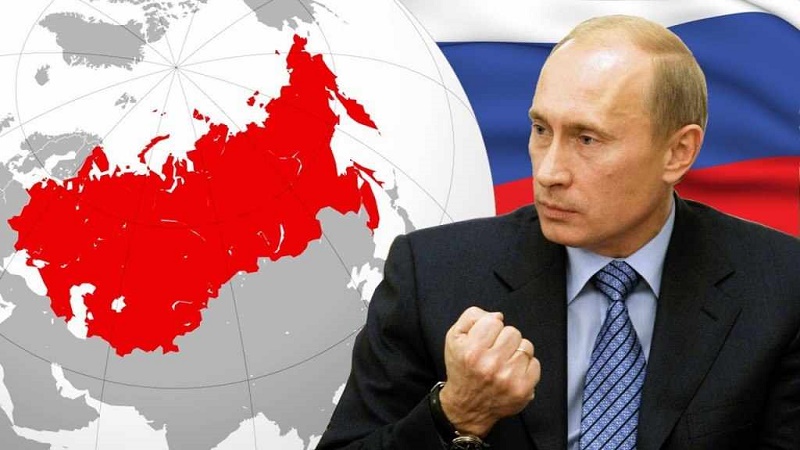
How come nobody predicted the invasion?
There were not many who predicted the invasion because few could imagine that Russia would become that aggressive. The Russian invasion of Georgia in 2008 was a clear warning bell, but the EU did not do much. Only the Swedish and Polish foreign ministers demanded measures against Russia. A major reason why this did not succeed is because Putin had several powerful friends in the EU - among these Berlusconi (at the time president of Italy) and Sarkozy (at the time president of France). They are still close friends of Putin, they meet regularly, and they are both aiming for a political revenge and to reclaim the presidencies. As it looks right now, Sarkozy will succeed in 2018. It is not a coincidence that Sarkozy became the mediator during the Russian warfare in Georgia which ended by a "frozen" conflict where two regions, Abkhazia and South Ossetia, are de facto Russian-controlled occupied territories with ethnic cleansing of the native population of Georgians. Sarkozy also signed a business deal with Russia regarding the manufacturing of two war vessels (helicopter carriers known as Mistrals), a project that later was abandoned by the current French president Hollande due to the Russian warfare in Ukraine. Below, Putin and Berlusconi, photographed during their recent visit in Russian-occupied Crimea.
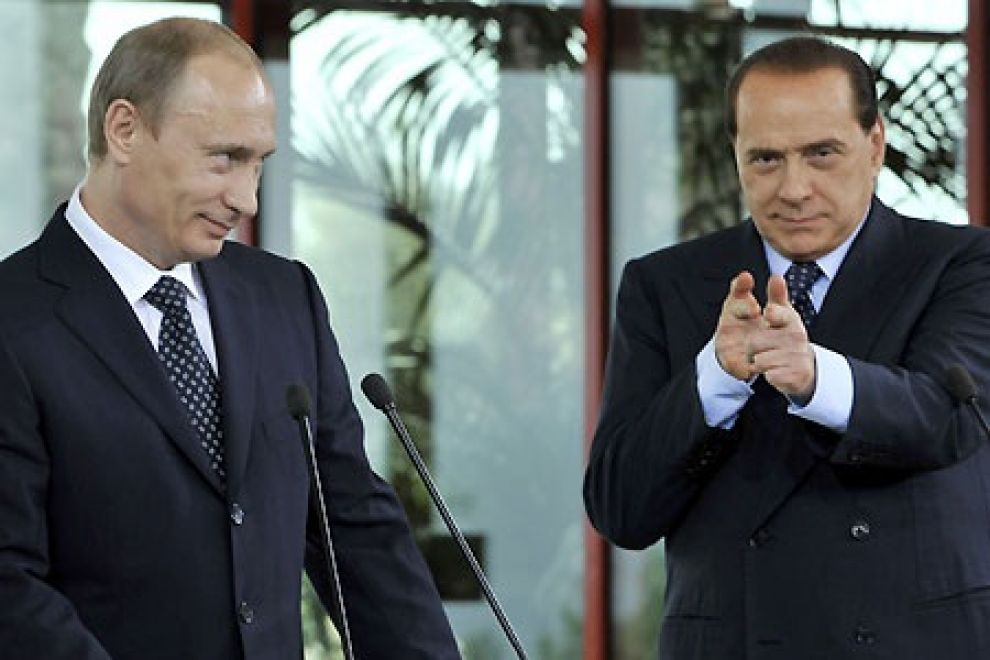
So, it began in Crimea?
Yes. Putin made use of what we today refer to as "hybrid warfare". The invasion of Crimea began with a Russian led "uprising" where it would look like the people in Crimea did not support the government in Kiev. However, these uprising attempts did not succeed as a majority of the people in Crimea were against it. Spontaneous counter demonstrations occured with much greater participation. Suddenly, soldiers without insignia appeared on the streets (later on admitted by Putin of being Russian soldiers), preventing further counter demonstrations by threatening and assaulting people who did not obey their orders. The Crimean local parliament was then taken over by these "unknown" armed soldiers (called "the little green men" internationally and "the polite people" in the Russian propaganda). Under gun threat, they set up a new Russia friendly Crimean parliament, lead by the former mafia gangster Aksyonov. This illegal new parliament then decided to carry out a referendum. The Crimeans had to choose between "belonging to Russia" and "sort of belonging to Russia". At the same time, the Russian authorities promised the Crimean people vastly increased wages and pensions. According to the Ukrainian constitution, a referendum needs to be approved by the government in Kiev and the legally elected local parliament. None of these conditions was fulfilled. Thus, the referendum was illegal and not recognized internationally. The ficticious result of the referendum (votes being counted by the Russians of course) showed that 85% of the Crimeans voted, and that 96% voted YES to belong to Russia. Just to show how absurd this is, the last poll conducted before the Russian invasion showed only 23% support for Russian annexation. All these events - the arranged uprising, the overtaking of the local parliament, and the fake referendum, were planned long in advance, in fact before Yanukovych was ousted. And how do we know? Because Putin admitted so a year later, when he proudly revealed his wicked deed to the Russian people on national television. In Russia, where the people are being hammered daily by the propaganda, Putin is widely considered a hero who "returned Crimea to Russia", neglecting the fact that Crimea has belonged to the Ukrainian SSR since 1954 and the independent Ukraine since 1991. Moreover, if going further back in history to 1897, the census back then reported just 33% of the Crimean people being ethnic Russians.
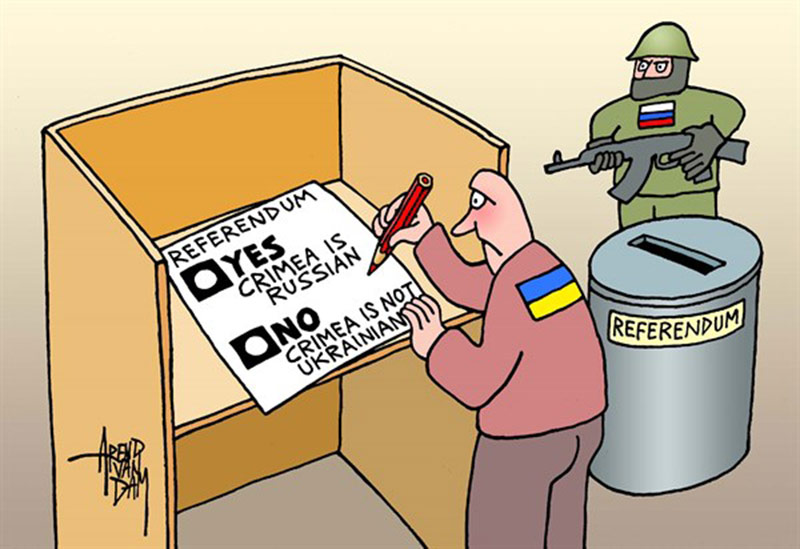
But why did not Ukrainian military stop the events in Crimea?
At the time, Ukrainian military was heavily corrupted, there were generals and other superior officers who were bribed by the Russians. They did nothing. Putin knew that this would happen, but that he needed to act fast in order to prevent counter measures by the Ukrainian parliament. At the same time, Ukraine wanted to prevent a blood bath which may have led to a full-scale war with Russia. There were also pressure from USA and EU not to aggravate the conflict. With the weak army that Ukraine possessed back then, it would become an easy victory for Russia. It took several months for Ukraine to strengthen the military, which had been financially neglected by Yanukovych for years.

How is life in Crimea today compared to before the annexation?
Crimea is internationally isolated, sanctioned not only by their most important neighbour Ukraine but also by the EU, USA, Canada, Japan, Australia and most other western countries. The consequence being that hardly anyone wants to do any business there, which in turn leads to unemployment and recession. Tourism has flopped since no Ukrainians spend their holidays there anymore, only Russians go there. Inflation is very high, food prices have inreased by 60%. On top of this, the minority who supported the annexation are getting disappointed. The most serious consequence however is the victimization of Ukrainians and Tatars (almost half of the Crimean population). People who oppose the annexation are jeopardizing their jobs and security. There have been people kidnapped and murdered. I visited this beautiful peninsula back in 2008, just after the Russian invasion of Georgia, and I then realized that one day Russia will also go after Crimea. I was imagining a terror act, combined with armed Russian separatists as a pretext for a Russian invasion. We talked to a taxi driver there, he did not like the Russians at all.
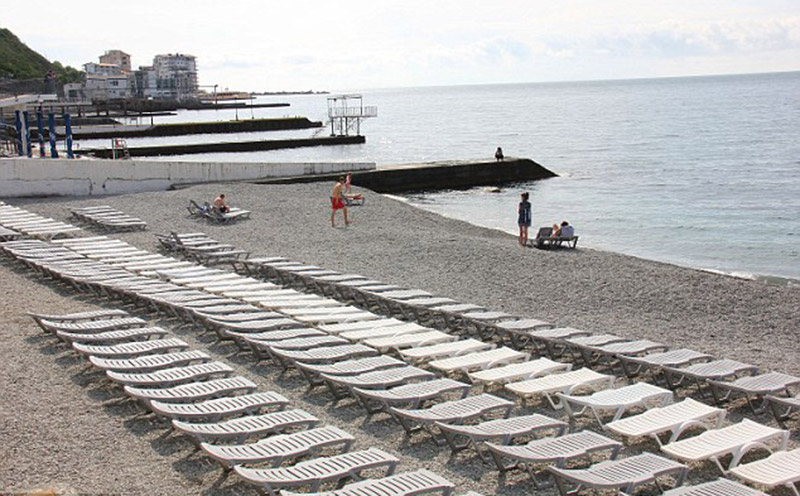
So, then the war spread to Donbas?
In fact, Putin made similar attempts of arranged uprisings in other Ukrainian oblasts. In Odessa, a group of armed Russian separatists shot at people while the local corrupted police did nothing. The local population, mainly football supporters returning from a local game, then in outrage chased the pro-Russian terrorists to a union building. There, the terrorists accidentally ignited a petrol bomb and most of them died in the fire. The truth is, however, twisted in the Russian propaganda which blames "Pro-Kiev activists for killing peaceful demonstrators". The people in Russian speaking Odessa loath the Russians. Putin gained more success in the South East, in the Donbas oblast, where the police and military were particularly weak. Similar to what occured in Crimea, buses loaded with paid Russian "demonstrators" visited various cities such as Donetsk, Luhansk, Mariupol and Sloviansk. The same faces appeared on photographs in all these cities - a solid proof of what was going on. Just like in Crimea, they soon began to occupy official buildings, raising Russian flags. A local poll in Donetsk and Luhansk, conducted right after these events, showed only 13% support for these pro-Russian occupants. The weak Ukrainian military did not manage to suppress these hostile overtakings. An armed, organized, gang of pro-Russians then appeared, not afraid of shooting and assaulting anyone who criticized their actions. Local politicians and officials were assaulted and murdered, and people no longer dared to express their anger and frustration over the situation. Soon, all major cities in Donbas were occupied by these well-armed pro-Russians with weapons coming from "nowhere". Donetsk and Luhansk "people's republics" were announced and another illegal referendum took place.

When did the Ukrainian army recapture parts of Donbas?
It was in the summer of 2014, when the Ukrainian people had elected their new president Poroshenko. The Ukrainian military had become stronger and more efficient, recapturing Sloviansk, Mariupol and other parts of Donbas. Putin realized that the pro-Russians were too few and too poorly armed to be able to stop the Ukrainian army from advancing further. Then, Russian troops, together with a massive inflow of tanks, surface-to-air missile systems and other lethal weapons, were sent over the border. The Ukrainian army was halted by the Russians, and a peace deal (Minsk II) initiated a temporary "cease fire".

Why do not Russia declare a full-scale war on Ukraine?
Putin has all this time rejected that Russia has anything to do with the war, calling it a "civil war between freedom fighters in the east and fascists in the west", despite convincing proofs of the Russian involvement with the help of satellite pictures, stories from journalists and captured Russian officers, videos recorded by witnesses, and by displaying confiscated Russian weapons. The reason why Putin does not go ahead with a full-scale war is that it would lead to devastating consequences for Russia. The EU, USA and others, would apply even heavier sanctions on Russia, causing further recession. Russia has retaliated against the EU by applying food import sanctions, aggravating the situation further. At the same time, the world market price of oil is unusually low, hitting the important Russian energy sector severely. A committee of Soldiers' Mothers of Russia is reporting missing soldiers, and accuses Putin of sending troops to Ukraine, some of them returning home in coffins. Putin realizes that if he would start a full-scale war, the EU would respond harshly with more severe sanctions and isolation whereas USA and Canada will likely aid Ukraine with lethal weapons. Russia simply cannot afford it, and Russian people will protest and question Putin as they are not keen on sending their sons to a full-scale war. Below is a part of the front cover of Newsweek (Sep/2014).
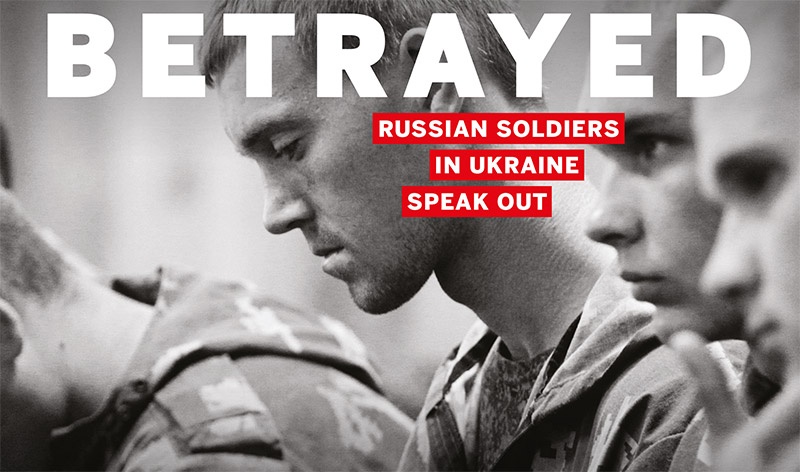
What about the Malaysia Airlines MH17 that was shot down?
In July 2014 the international passenger flight MH17 from the Netherlands to Malaysia crashed in Russian controlled Donetsk area after being shot down, killing all 283 passengers and 15 crew members on board. The Dutch Ministry Of Justice is currently investigating what happened, going through hundreds of witness confessions and other material. They have suggested a UN lead tribunal for putting the responsible people on trial. However, as expected, Russia vetoed, thus prevented it. The final report, which includes a spontaneous confession by Russian separatists in social media right after the crime, concludes that the plane was shot down by pro-Russian insurgents using a Buk surface-to-air missile (SA-11) fired from the territory which they controlled. This incident once again proves the presence of Russian troops and lethal weapons provided by Russia on Ukrainian territory. Of course, Russia officially denies any involvement but instead presents wild speculations about Ukrainian involvement (for which there is no proof of whatsoever).
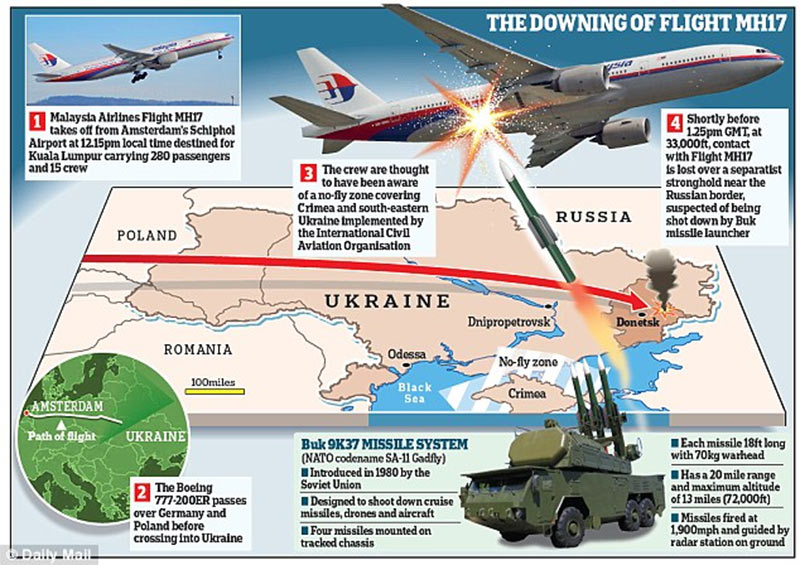
How deavastating has the Russian invasion become?
The casualties (as of September 2015) of this Russian warfare amount to approximately 7,600 people (including 2,700 Russian soldiers and separatists). You can compare this with the causalties of American soldiers in the Iraq war (4,491), the September 11 attacks (2,996), and the Russio-Georgian war (873). Morover, the war has caused huge damages to the Ukrainian economy, and to the Russian economy as well. None of these countries will be able to repair that without external help. Relations between Ukrainians and Russians, often regarded as brother nations, will be poisoned for generations to come. Many Ukrainians will never forget and will never forgive.

Why do not the Russians protest against this war?
There are Russians who are opposing the warfare but they are not treated well. Politicians and journalists who dare to oppose Putin are either fired, jailed, sabotaged, threated, assaulted, in exile or murdered. Russia is going back to a typical police state with no freedom of speech and no freedom of the press. New Russian legislation forbids "hostile attitude" towards the state. Anyone opposing the annexation of Crimea may face prison for up to five years. There are highly respected professors and lecturers at schools and universities who have lost their profession after criticizing Putin's aggressive foreign policy. At the same time, the regime applies aggressive anti-west propaganda in the state controlled media, providing lies and desinformation to the Russian people in order to tame them and confuse them. Books are being censored. Children are being taught at school about the supreme Russia which has "the right to recapture" Crimea. Just like Hitler, Putin understands the need to tame forthcoming generations to become loyal citizens and soldiers. One example being his youth organization "Nashi" (a.k.a. "Putinjugend") where children are taught to disturb certain oppositional events, and they have conducted threats and assaults on dissidents.
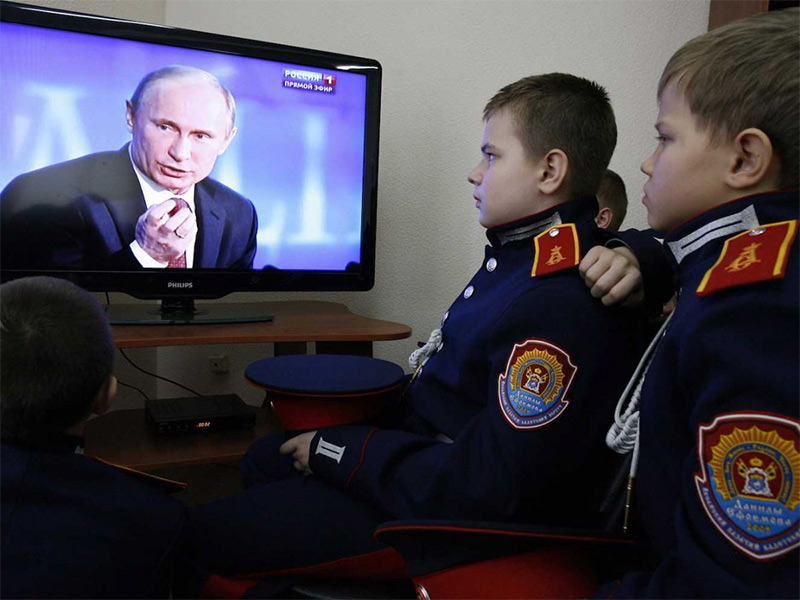
So, what happens now?
There is right now (September 2015) no sign of any withdrawal of Russian troops or weapons. On the contrary, there are reports of an increasing number of Russian tanks and military equipment crossing the border to Ukraine. This occurs despite a peace protocol, Minsk II, where Russia has promised to withdraw completely by the end of 2015. Of course, nobody has seriously believed that to happen. Putin will not return Crimea, and he will not withdraw the Russian troops. There are fears that Russia may advance further. At the same time, Russia is bleeding economically. The Russian GNP (Gross National Product) is down -4.7% since July 2014. This is a figure that should make any president nervous and desperate. Putin, however, decides not to cut down on the military expenses which he prioritizes above all. Russia has so far survived by draining the central bank's currency reserves, but it cannot go on like this forever. In fact, just within a couple of years, in 2017, Russia may go bankrupt and suffer from ultra-high inflation, heavy wage cuts and starvation among the poorest. The Russian people has gone through similar economic recessions before, they remember the 1990's too well, and are known to show endurance. However, a new generation Russians, and a growing middle class, are used to western standards, foreign travelling, and high living standards. The line needs to be drawn somewhere, and the people will hardly accept the situation for long. The people close to Putin are suffering as well from the sanctions. If the solution for Russia is to return Crimea and leave Ukraine alone, it is a small price to pay to get Russia back on track. This solution is no option for Putin. But is Putin indispensible for Russia? We should keep in mind that the only reason for the growing living standards in Putin's period of ruling is the growth of energy demands in the world. Any other Russian president would have achieved the same result. The most logical development is a replacement in the Kremlin. How it will happen, and when it happens, is difficult to tell right now. Putin would like to get his hands on the Baltic countries, sort of returning to the Soviet occupied status during the Cold War. However, they are NATO members - perhaps the only reason why there are no Russian troops in the Baltics at present. If Putin chooses to become even more aggressive, to negligate the unavoidable consequences of a full-scale war, it may unfortunately result in involving the rest of Europe, and the world, into a new war with devastating outcome. His involvement in Syria has further increased the risk of a global conflict. We cannot wink at Putin and we cannot ignore him. If there will be a new world war, he is the one who will ignite it.